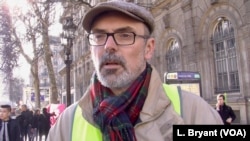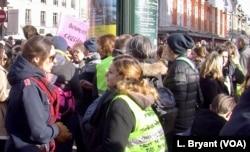They won’t go away. Week after week, France’s yellow vests are out on the streets, in one of the biggest and longest popular uprisings the country has seen in years; a political crisis with no easy exit.
On Saturday, roughly 51,000 protesters took to the streets for the thirteenth consecutive weekend but the numbers were down from January. Once again, the demonstrations were marked by violence, with one protester severely wounded in the hand.
Now heading into its fourth month, the unrest has cost the French economy billions of dollars in lost tourism and commerce, and morphed from anger over a fuel tax hike to include broader social and economic grievances.
Named after the trademark yellow security vests French citizens keep in their cars, the gilets jaunes or yellow vest movement is igniting similar protests elsewhere in Europe—even as some French unions and parties are eager to co-opt it. Last week It even helped to turn long-simmering tensions between France and Italy into a full-blown spat with Paris withdrawing its ambassador to Rome for ‘consultations,’ following a meeting between Italy’s deputy prime minister and yellow vests.
Some protesters claim they are driving a new French revolution—over old grievances, but also more recent reforms pushed by the government of President Emmanuel Macron. But their movement risks being splintered by its myriad demands, lack of clear leadership, and infighting within its ranks. Upcoming European Parliament elections may deepen the divisions, with purists maintaining the movement should stay out of politics.
“I think it will be very hard for the gilets jaunes to translate their success in French society into electoral success,” said Emmanuel Lafont Rapnouil, head of the Paris office of the European Council on Foreign Relations. “It’s not clear what they want, or whether they can organize quickly to make choices and compromises to have a proper platform.”
For the first time last week, yellow vests joined forces with leftist trade unionists in a nationwide strike for higher salaries and a fairer tax system. They packed central Paris on a sunny afternoon, marching to Place de la Concorde, known for its many executions during the French Revolution.
For many the symbolism was potent.
“We want the government to be fired,” said student Pierre-Antoine Charpentier, sporting orange hair and his fluorescent jacket. “This is too much—too many laws against the people, too much money for rich people, too many taxes for poor people.”
Nearby, protester Jerome Partage agreed the French president and his government must go.
“Macron is a big part of the problem,” he said. “He’s not the only problem, but he’s the best representative of politics we’ve had for 40 years, and he’s not going to negotiate anything.”
For the 41-year-old Macron, the ongoing protests easily amount to the biggest crisis facing his two-year-old presidency, and risk derailing a series of ambitious reforms. With his approval rating hitting record lows, the president did a U-turn late last year, repealing an unpopular fuel tax hike, and announcing pay rises and tax cuts for the most vulnerable.
Macron also acknowledged he was partly to blame for what he described as an ‘insufficient’ government response to yellow vest frustrations, a startling break for a president critics routinely describe as arrogant. And he sketched a partial blueprint for unwinding the crisis: three months of national debates, aimed to get citizen input on themes ranging from taxes and public services, to climate change and democracy.
Macron’s popularity has since inched up. But there does not appear to be a clear objective behind the raft of town hall meetings scheduled through mid-March that could potentially include millions of French. Among other outcomes, the president is mulling a referendum, possibly piggybacking on the European parliament vote in May.
But that option is risky. The last referendum saw voters delivering one of Macron’s predecessors, Jacques Chirac, a massive setback in 2005, by rejecting a European Union constitution.
And on the streets, there appears to be little support for either a referendum or Macron.
“I think for Macron, this great debate is just a game,” said yellow vest protester Sabrina Drljevic-Pierre, an unemployed local development worker. “He’s spending taxpayers’ money to do publicity and it’s really pathetic.”
Still, the yellow vests face their own challenges. Several are eyeing a run for European parliament. Initial polls suggest they could score well. But so far, the movement has produced no unified list of candidates, and some members believe it should stay out of politics altogether.
“It’s a really bad idea,” said protester Monique Pedron. “Maybe they’re people who need recognition, but I’m against it.”
Retired school teacher Jean-Francois Wolff is also underwhelmed by prospects of a yellow vest party. But as he prepared to join yet another protest, he was at loss to predict how the uprising would end.
“The government hopes this will peter out, but we’re still here,” Wolff said. “The yellow vests are determined. So is public opinion.”










